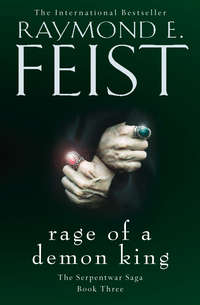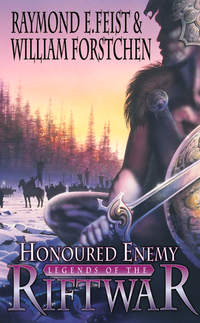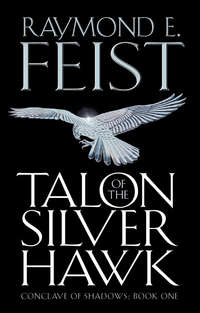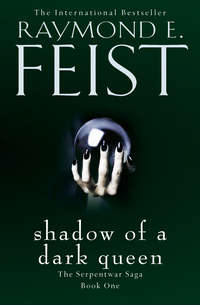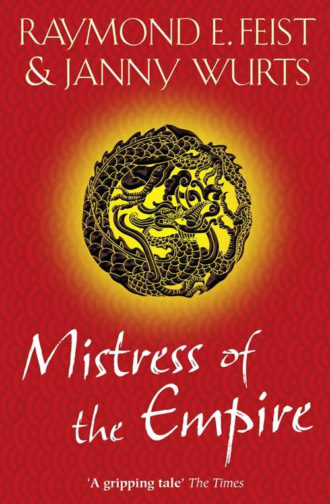
Полная версия
Mistress of the Empire
The sudden step into shadow caused Hokanu to shiver. For the first time, the beautifully tiled stonework did not offer him the feeling of shelter. The beautiful painted screens he and Mara had commissioned did not warm him to admiration. Instead he felt gnawing doubt; had young Ayaki’s death been an expression of the gods’ displeasure, that Mara should claim as spoils the properties of her fallen enemies? The Minwanabi who had once walked these halls had sworn blood feud against the Acoma. Eschewing tradition, Mara had not buried their natami, the talisman stone that secured the spirits of the dead to life’s Wheel as long as it stood in sunlight. Could the lingering shades of vanquished enemies visit ill luck on her and her children?
Afraid for young Justin’s safety, and inwardly reprimanding himself for giving credence to superstitions, Hokanu focused upon Mara. Where death and loss had always hardened her to courage and action, now she seemed utterly devastated. She saw the boy’s corpse into the great hall, her steps like those of a mannequin animated by a magician’s spell. She sat motionless at the bier side while servants and maids bathed her child’s torn flesh, and robed him in the silks and jewels that were his heritage as heir of a great house. Hokanu hovered nearby, aching with a sense of his own uselessness. He had food brought, but his lady would not eat. He asked for a healer to make up a soporific, expecting, even hoping, to provoke an angry response.
Mara dully shook her head and pushed the cup away.
The shadows on the floor lengthened as the sun crossed the sky, and the windows in the ceiling admitted steepening angles of light. When the scribe sent by Jican tapped discreetly on the main door a third time, Hokanu at last took charge and told the man to seek out Saric or Incomo, to make up the list of noble houses who should be informed of the tragedy. Plainly Mara was not up to making the decision herself. Her only movement, for hours, had been to take the cold, stiff fingers of her son in her own.
Lujan arrived near dusk, his sandals dusty, and more weariness in his eyes than he had ever shown on campaign. He bowed to his mistress and her consort and awaited permission to speak.
Mara’s eyes remained dully fixed on her son.
Hokanu reached out and touched her rigid shoulder. ‘My love, your Force Commander has news.’
The Lady of the Acoma stirred, as if roused from across a great distance. ‘My son is dead,’ she said faintly. ‘By the mercy of all the gods, it should have been me.’
Rent to the heart by compassion, Hokanu stroked back a fallen wisp of her hair. ‘If the gods were kind, the attack should never have happened.’ Then, as he saw that his Lady had slipped back into her stupor, he faced her officer.
The eyes of both men met, anguished. They had seen Mara enraged, hurt, even in terror of her life. She had always responded with spirit and innovation. This apathy was not like her, and all who loved her feared that a portion of her spirit might have perished along with her son.
Hokanu endeavored to shoulder as much of the burden as possible. ‘Tell me what your men have found, Lujan.’
Had Mara’s Force Commander been a more tradition-bound man, he would have refused; while Hokanu was a noble, he was not master of the Acoma. But the Shinzawai faction of the household was sworn to alliance with the Acoma, and Mara was in no condition to make critical decisions. Lujan released an almost imperceptible sigh of relief. The strengths of the Shinzawai heir were considerable, and the news Lujan brought was not cheering. ‘My Lord, our warriors searched the corpse to no avail. Our best trackers joined the search and, in a hollow where the assassin had apparently been sleeping, found this.’
He offered a round shell token, painted scarlet and yellow, and incised with the triangular sigil of House Anasati. Hokanu took the object with a touch that bespoke disgust. The token was the sort a Ruling Lord might give a messenger as proof that an important errand had been carried out. Such a badge was inappropriate for an enemy to entrust to an assassin; but then, the Lord of the Anasati made no secret of his hatred for Mara. Jiro was powerful, and openly allied with houses who wished to abolish the Emperor’s new policies. He was a scholar rather than a man of war, and though he was too clever to indulge in crude gestures, Mara had once slighted his manhood: she had chosen his younger brother for her first husband, and since that day, Jiro had shown open animosity.
Still, the shell counter was blatantly unsubtle, for a working of the Great Game. And the Hamoi Tong was too devious a brotherhood to consent to the folly of carrying evidence of which Lord or family might have hired it. Its history extended back for centuries, and its policies were cloaked in secrecy. To buy a death from it ensured absolute discretion. The token could be a play designed to throw blame upon the Anasati.
Hokanu raised concerned eyes to Lujan. ‘You think Lord Jiro was responsible for this attack?’
His query was less a question than an implied expression of doubt. That Lujan also had reservations about the placement of the token was evident as he drew breath to reply.
But the name of the Anasati Lord had pierced through Mara’s lethargy. ‘Jiro did this?’ She spun from Ayaki’s body and saw the red-and-yellow disk in Hokanu’s hand. Her face contorted into a frightening mask of fury. ‘The Anasati shall be as dust in the wind. Their natami will be buried in offal, and their spirits be consigned to the dark. I will show them less mercy than I did the Minwanabi!’ Her hands clenched into fists. She stared without seeing between her husband and her Force Commander, as though her detested enemy could be made manifest through the force of her hatred. ‘Not even that will pay for the blood of my son. Not even that.’
‘Lord Jiro might not be responsible,’ Lujan offered, his usually firm voice torn by grief. ‘You were the target, not Ayaki. The boy is the nephew of the Anasati Lord, after all. The tong assassin could have been sent by any of the Emperor’s enemies.’
But Mara seemed not to hear. ‘Jiro will pay. My son will be avenged.’
‘Do you think Lord Jiro was responsible?’ Hokanu repeated to the Force Commander. That the young Anasati heir still felt as he did, even after inheriting the mantle and power that had been his father’s, bespoke stubborn, and childish pride. A mature mind would no longer nurse such a grudge; but in vain arrogance, the Anasati Lord might well wish the world to know whose hand had contracted for Mara’s downfall.
Except that since Mara was Servant of the Empire, her popularity was too widespread. Fool Jiro might be, over slighted manhood, but surely not so much that he would invite the Emperor’s wrath.
Lujan turned dark eyes toward Hokanu. ‘That bit of shell is all the evidence we have. Its very obviousness might be subtle, as if by calling attention to House Anasati, we might dismiss them at once and look elsewhere for the culprits.’ Fury coiled beneath his words. He, too, wanted to strike in anger at the outrage that had been committed. ‘It matters very little what I think,’ he finished grimly. For honor demanded that he do his Lady’s will, absolutely and without question. If Mara asked him to muster the Acoma garrison and march suicidally to war, he would obey, with all his heart and will.
Dusk dimmed the skylights in the great hall. Servants entered on quiet feet and lit the lamps arrayed around Ayaki’s bier. Scented smoke sweetened the air. The play of warm light softened death’s pallor, and shadow veiled the misshapen lumps of the injuries beneath the silk robes. Mara sat alone in vigil. She regarded her son’s oval face, and the coal-dark hair that, for the first time she could remember, had stayed combed for more than an hour.
Ayaki had been all of her future, until that moment of the gelding’s crushing fall. He had been her hopes, her dreams, and more: the future guardian of her ancestors and the continuance of the Acoma name.
Her complacence had killed him.
Mara clenched white fingers in her lap. She never, ever, should have lulled herself into belief that her enemies could not touch her. Her guilt at this lapse in vigilance would follow her all her days. Yet how bleak any contemplation of tomorrow had become. At her side lay a tray with the picked-over remains of a meal; the food had no taste that she could recall. Hokanu’s solicitude had not comforted; she knew him too well, and the echoes of her own pain and anger she could sense behind his words galled her into deeper recriminations.
Only the boy showed no reproach for her folly. Ayaki was past feeling, beyond reach of sorrow or joy.
Mara choked back a spasm of grief. How she wished the dart had taken her, that the darkness which ended all striving could be hers, instead of her son’s. That she had another surviving child did not lessen her despair. Of the two, Ayaki had known the least of life’s fullness, despite his being the elder. Fathered by Buntokapi of the Anasati, whose family had been an Acoma enemy, in a union from which Mara had derived much pain and no happiness. Political expediency had led her to deeds of deceit and entrapment that to her maturer view seemed no less than murder. Ayaki had been her atonement for his father’s wasteful suicide, brought about by Mara’s own machinations. Although by the tenets of the Game of the Council she had won a telling victory, privately she considered Buntokapi’s death a defeat. That his family’s neglect had made of him a tool open for her to exploit made no difference. Ayaki had offered her a chance to give her first husband’s shade lasting honor. She had been determined that his son would rise to the greatness that Buntokapi had been denied.
But the hope was ended now. Lord Jiro of the Anasati had been Buntokapi’s brother, and the fact that his plot against her had misfired and resulted in a nephew’s death had shifted the balance of politics yet again. For, without Ayaki, the Anasati were free to resume the enmity quiescent since her father’s time.
Ayaki had grown up with the best teachers, and all of her soldiers’ vigilance to protect him; but he had paid for the privileges of his rank. At nine he had nearly lost his life to an assassin’s knife. Two nurses and a beloved old household servant had been murdered before his eyes, and the experience had left him with nightmares. Mara resisted an urge to rub his hand in comfort. The flesh was cold, and his eyes would never open in joy and trust.
Mara did not have to fight down tears; rage at injustice choked her sorrow for her. The personal demons that had twisted his father’s nature toward cruelty had inspired melancholy and brooding in Ayaki. Only in the past three years, since Mara’s marriage to Hokanu, had the sunnier side of the boy’s nature gained ascendancy.
The fortress of the Minwanabi, Ayaki had been fond of pointing out, had never been so much as besieged. The defenses here were impregnable to an enemy. Moreover, Mara was a Servant of the Empire. The title carried favor with the gods, and luck enough to ward away misfortune.
Now, Mara berated herself for allowing his childish, blind faith to influence her. She had used traditions and superstitions to her advantage often enough in the past. She had been a vain fool not to see that the same things could be exploited against her.
It seemed an injustice that the child should have paid, and not her.
His small half-brother, Justin, had helped lighten Ayaki’s bleak spells. Her second son was the child of the barbarian slave she still loved. She had only to close her eyes for an instant and Kevin’s face came to mind, nearly always smiling over some ridiculous joke, his red hair and beard shining copper under Kelewan’s sun. With him she had shared none of the harmonious rapport she now enjoyed with Hokanu. No, Kevin had been tempestuous, impulsive, at times passionately illogical. He would not have hidden his grief from her, but would have freed his feelings in an explosive storm; in his intense expression of life she might have found the courage to face this outrage. Young Justin had inherited his father’s carefree nature. He laughed easily, was quick to get into mischief, and already evidenced a fast tongue. Like his father before him, Justin had a knack for snapping Ayaki out of his brooding. He would run on fat legs, trip, and tumble over laughing, or he would make ridiculous faces until it was impossible to be near him and stay withdrawn.
But there would be no more shared laughter for Ayaki now.
Mara shivered, only that moment conscious of the presence of someone at her side. Hokanu had entered the chamber in the uncannily silent manner he had learned from the foresters on the barbarian world.
Aware that she had noticed him, he took her cold hand into his warm one. ‘My Lady, it is past midnight. You would do well to take some rest.’
Mara half turned from the bier. Her dark eyes fastened on Hokanu’s, and the compassion in his gaze caused her to dissolve into tears. His handsome features blurred, and his grip shifted, supporting her body against his shoulder. He was strong in the same sparely muscled way of his father. And if he did not kindle the wild passion that Kevin had, with him, Mara shared an effortless understanding. He was husband to her as Ayaki’s father had never been, and his presence now as grief crumbled her poise was all that kept her from insanity. The touch that sought to soothe her sorrow was that of a man well capable of command on the field of war. He preferred peace, as she did, but when the ways of the sword became necessary, he had the courage of the tigers that inhabited the world beyond the rift.
Now, belatedly, the Acoma would need those skills in battle.
As tears rinsed Mara’s cheeks, she tasted bitterness that knew no limit. The guilt inside her had a name she could use as a scapegoat. Jiro of the Anasati had murdered her son; for that, she would destroy his house beyond the memory of the living.
As though he sensed the ugly turn of her thoughts, Hokanu shook her gently. ‘My Lady, you are needed. Justin cried all through his supper, asking what had happened to his mama. Keyoke called each hour for instructions, and Force Commander Lujan needs to know how many companies should be recalled from garrison duty at your estates near Sulan-Qu.’
In his inimitably subtle way, Hokanu did not argue the necessity for war. That brought relief. Had he offered questions, had he sought to dissuade her from vengeance against Jiro upon grounds that a single shell token offered too scanty evidence, she would have turned on him in a fury. Who was not with her at this moment was against her. A blow had been struck against the Acoma, and honor demanded action.
But the form of her murdered son sapped her will; life in any form seemed sucked dry, devoid of interest.
‘Lady?’ prompted Hokanu. ‘Your decisions are necessary for the continuance of your house. For now you are the Acoma.’
A frown gathered Mara’s eyebrows. Her husband’s words were truth. Upon their marriage, they had agreed that young Justin would become the Shinzawai heir after Hokanu. Fiercely, suddenly, Mara wished that promise unspoken. Never would she have agreed to such a thing had she realised Ayaki’s mortality.
The circle closed, again. She had been negligent. Had she not grown dangerously complacent, her black haired son would not lie in state inside a circle of death lamps. He would be running, as a boy should, or practicing the skills of a warrior, or riding his great black gelding faster than the wind over the hills.
Again Mara saw in her mind’s eye the arc of the brute’s rearing form, and the terrible, thrashing of hooves as it toppled …
‘Lady,’ chided Hokanu. Tenderly he pried her fingers open, and endeavored to stroke away her tension. ‘It is over. We must continue to strive for the living.’ His hands brushed away her tears. More spilled between her eyelids to replace them. ‘Mara, the gods have not been kind. But my love for you goes on, and the faith of your household in your spirit shines like a lamp in the darkness. Ayaki did not live for nothing. He was brave, and strong, and he did not shy from his responsibilities, even at the moment of his death. As he did, so must we or the dart that felled the horse will deal more than one mortal blow.’
Mara closed her eyes, and tried to deny the oil-scented smoke of the death lamps. She did not need reminding that thousands of lives depended upon her, as Ruling Lady of the Acoma; today she had paid for the proof that she did not deserve their trust. She was regent for a growing son no longer. There seemed no heart left in her, and yet she must prepare for a great war, and achieve vengeance to keep family honor, and then, she must produce another heir.
Yet the hope, the future, the enthusiasms, and the dreams she had sacrificed so much for had all gone to dust. She felt numbed, punished beyond caring.
‘My Lord and husband,’ she said hoarsely ‘attend to my advisers, and have them do as you suggest. I have not the heart to make decisions, and the Acoma must make ready for battle.’
Hokanu looked at her with wounded eyes. He had long admired her spirit, and to see her beautiful boldness overcome by grief made his heart ache. He held her close, knowing the depth of her pain. ‘Lady,’ he whispered softly. ‘I will spare you all I can. If you would march upon Jiro of the Anasati, I will stand at the right hand of your Force Commander. But sooner or later, you must put on the mantle of your house. The Acoma name is your charge. Ayaki’s loss must not signify an ending but create a renewal of your line.’
Past speech, beyond rational thought, Mara turned her face into her husband’s shoulder, and for a very long time her tears soaked soundlessly into the rich blue silk of his robe.
• Chapter Two • Confrontation
Jiro frowned.
Though the unadorned robe he wore was light and the portico around the courtyard adjacent to his library was still cool at this early hour, fine sweat beaded his brow. A tray of half-eaten breakfast lay abandoned at his elbow, while he tapped tense fingers on the embroidered cushion he sat on; his eyes unwaveringly studied the game board spread at his knees. He considered the position of each piece singly, and sought to assess the probable outcome of each move. A wrong choice might not seem immediately obvious, but against today’s opponent, the consequences were apt to prove ruinous several moves later. Scholars claimed the game of shah sharpened a man’s instinct for battle and politics, but Jiro, Lord of the Anasati, enjoyed puzzles of the mind over physical contests. He found its intricacies hypnotic for their own sake.
His skills had surpassed those of his father and other teachers at a precociously early age. When he was a boy, his older brother, Halesko, and younger brother, Buntokapi, had often as not pummeled him for the contemptuous ease he displayed in defeating them. Jiro had sought older opponents, and had even contended against the Midkemian traders who visited the Empire more and more often, seeking markets for their otherworld goods. They called the game chess, but the rules were the same. Jiro found few in their ranks to challenge him.
The one man he had never defeated sat opposite him, absently scanning through an array of documents piled meticulously around his knees. Chumaka, First Adviser to the Anasati since Jiro’s father’s time, was a whip-thin, narrow-faced man with a pointed chin and black, impenetrable eyes. He checked the game board in passing, now and again pausing to answer his master’s moves. Rather than being irritated by the absent-minded fashion in which his First Adviser routinely defeated him, Jiro felt pride that such a facile mind served the Anasati.
Chumaka’s gift for anticipating complex politics at times seemed to border on the uncanny. Most of Jiro’s father’s ascendancy in the Game of the Council could be credited to this adviser’s shrewd advice. While Mara of the Acoma had humiliated the Anasati early in her rise to greatness, Chumaka had offered sage counsel that had sheltered family interests from setbacks in the conflict that had followed between the Acoma and the Minwanabi.
Jiro chewed his lip, torn between two moves that offered small gains and another that held promise of long-term strategy. As he debated, his thoughts circled back to the Great Game: the obliteration of House Minwanabi might have proven a cause for celebration, since they had been rivals of the Anasati – save that the victory had been won by the woman Jiro hated foremost among the living. His hostility remained from the moment Lady Mara named her choice of husband, and picked his younger brother, Buntokapi, as her consort over Jiro.
It did not matter that, had his ego not suffered a bruising, Jiro would have been the one to die of the Lady’s machinations, instead of Bunto. Enamored though he was of scholarly thought, the last surviving son of the Anasati line stayed blind to logic on this point. He fed his spite by brooding. That the bitch had cold-heartedly plotted the death of his brother was cause for blood vengeance; never mind that Bunto had been despised by his family, and that he had renounced all ties to Anasati to accept the Lordship of the Acoma. So deep, so icy was Jiro’s hatred that he preferred obstinate blindness to recognition that he had inherited his own Ruling Lordship precisely because Mara had spurned him. Over the years his youthful thirst for retribution had darkened into the abiding obsession of a dangerous, cunning rival.
Jiro glared at the shah board but raised no hand to advance a player. Chumaka noticed this as he riffled through his correspondence. His high brows arched upward. ‘You’re thinking of Mara again.’
Jiro looked nettled.
‘I have warned you,’ Chumaka resumed in his grainy, emotionless voice. ‘Dwelling on your enmity will upset your inner balance and ultimately cost you the game.’
The Lord of the Anasati indicated his contempt by selecting the bolder of the two short-range moves.
‘Ah.’ Chumaka had the ill grace to look delighted as he removed his captured minor player. With his left hand still occupied with papers, he immediately advanced his priest.
The Anasati Lord chewed his lip, vexed; why had his First Adviser done that? Enmeshed in an attempt to fathom the logic behind the move, Jiro barely noticed the messenger who hurried into the chamber.
The arrival bowed to his master. Immediately upon receiving the languid wave that allowed him leave to rise, he passed the sealed packet he carried to Chumaka.
‘Your permission, master?’ Chumaka murmured.
‘The correspondence is coded, is it not?’ Jiro said, not wanting the interruption as he pondered his next move. His hand lingered between pieces, while Chumaka cleared his throat. Jiro took this for affirmation. ‘I thought so,’ he said. ‘Open your dispatches, then. And may the news in them for once dull your concentration for the game.’
Chumaka gave a short bark of laughter. ‘The more scurrilous the gossip, the keener I will play.’ He followed Jiro’s indecision with an amusement that almost, but not quite, approached contempt. Then he flipped over the pouch and used the one thumbnail he left unbitten for the purpose to slit the tie.
As he thumbed through the papers inside, his brows arched. ‘This is most unexpected.’
The Lord of the Anasati’s hand hung in space. He looked up, intrigued by the novelty of his First Adviser’s surprise. ‘What?’
Servant to two generations of Ruling Lords, Chumaka was rarely caught out. He regarded his master, speculation in the depths of his eyes. ‘Pardon, my Lord. I was speaking of this.’ He drew a paper from the pouch. Then, as his peripheral sight took in the piece under Jiro’s poised hand, he added, ‘Your move is anticipated, master.’
Jiro withdrew his hand, caught between irritation and amusement. ‘Anticipated,’ he muttered. He lounged back on his cushions to settle his mind. From this changed vantage, the game board showed a different perspective; a trick picked up from his father at an early age.


